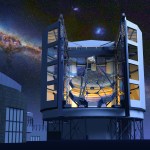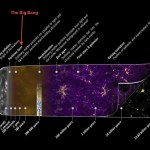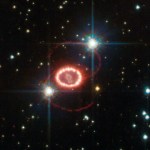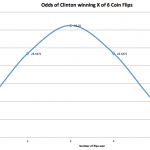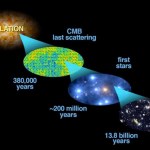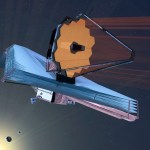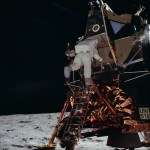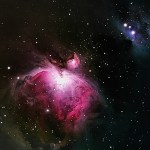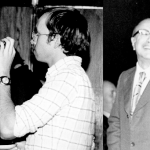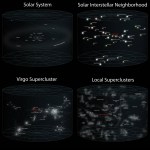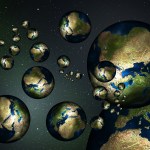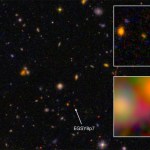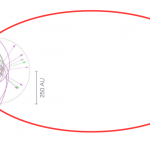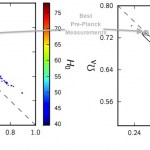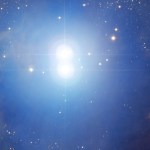
"We find them smaller and fainter, in constantly increasing numbers, and we know that we are reaching into space, farther and farther, until, with the faintest nebulae that can be detected with the greatest telescopes, we arrive at the frontier of the known universe." -Edwin Hubble
If you want to see farther, deeper and at higher resolution than ever before into the Universe, you need four things: the largest aperture possible, the best-quality optical systems and cameras/CCDs, the least interference from the atmosphere, and the analytical techniques and power to make the most of every…
“These theories were based on the hypothesis that all the matter in the universe was created in one big bang at a particular time in the remote past.” -Fred Hoyle
It’s making headlines every time someone brings it up: a quantum calculation, a new theory or some mathematical evidence proves it once and for all: there was no Big Bang.
Image credit: NASA / STScI / A. Felid.
Is that even possible? Honestly, it depends on which definition of the Big Bang you’re using. As it turns out, there are two of them, and there’s a good (historical) reason for that. But in the context of what we…
"It’s becoming clear that in a sense the cosmos provides the only laboratory where sufficiently extreme conditions are ever achieved to test new ideas on particle physics. The energies in the Big Bang were far higher than we can ever achieve on Earth. So by looking at evidence for the Big Bang, and by studying things like neutron stars, we are in effect learning something about fundamental physics." -Martin Rees
Neutron stars are some of the most extreme objects in the Universe: a ball of neutrons a few kilometers in diameter, but with more mass than the entire Sun in them. Their magnetic…
"[T]he coin of life has meaning and value no matter what side it lands on. It's each individual's choice whether to bet on the outcome or not, but ultimately your coin of life will be spent somehow." -Virgil Kalyana Mittata Iordache
Coin flips are traditionally the way to settle disputes with two choices and equal probabilities. They're ubiquitous not only in sporting events, but in events as important as elections, with thirty five states having adopted a coin flip as their official tiebreaker method. Yesterday, in Iowa, the democratic election was so close that there were six county…
"I like cappuccino, actually. But even a bad cup of coffee is better than no coffee at all." -David Lynch
Particularly in the dead of winter, most of us enjoy a hot drink, whether it's coffee, tea, hot chocolate or soup. But if that drink is too hot, your options for cooling it down are unsatisfying: wait for the room to cool it, which takes forever, drop an ice cube in, which waters down your drink, or blow on it.
Image credit: Wikimedia Commons user Pdbailey, who created this image and placed it in the public domain. The speed distribution is qualitatively the same for liquids as it is for…
"Most people don't know what's happening around them because they're just speeding through life. And before they know it, they're just old. So I just try to slow it down." -Tracy Morgan
Travel fast enough through the air, and you'll exceed the speed of sound. The compressed air in front of you builds up, denser and denser, creating a shock wherever you've exceeded the sound barrier. In interstellar space, stars that move fast enough do the exact same thing.
Image credit: GALEX, NASA’s Galaxy Evolution Explorer.
There doesn't need to be sound in space for runaway stars to compress gas,…
“What you get by achieving your goals is not as important as what you become by achieving your goals.” -Zig Ziglar
What a week it's been here at Starts With A Bang, where we've been proud to bring a number of stories to light for you. This past week, in case you missed anything, we've tackled:
Is the Universe itself alive? (for Ask Ethan),
How does space become transparent? The Orion Nebula answers (for Mostly Mute Monday),
The tragedy of Apollo 1 and the lessons that brought us to the Moon,
The future of astronomy: NASA's James Webb Space Telescope (the…
“Go then, there are other worlds than these.” -Stephen King, The Dark Tower
When you think about the Multiverse, everyone thinks about the Universe beyond what's accessible to us. But whether you think about more Universe like our own, multiple Universe that are disconnected from ours, an infinite number of parallel Universes, where possibly multiple copies of identical "yous" are entangled, or where the laws of physics are different from our own depends on what type of Multiverse you're talking about.
Image credit: Bock et al. (2006, astro-ph/0604101); modifications by me.
As it…
"Think about it this way - a boomerang goes out and comes back to you if you throw it. If you throw it out at the universe, it will come back down to you on Earth." -J. B. Smoove
Give a planet a kick, and it goes into a more distant orbit around our star. Give it a hard enough kick, and it will reach escape velocity, leaving our Solar System forever. But if you gave it an almost hard enough kick, it would travel extremely far from the Sun, but it would eventually boomerang back towards the inner Solar System, with potentially disastrous, disruptive consequences. This applies to any…
"Now the world has gone to bed,
Darkness won't engulf my head,
I can see by infrared,
How I hate the night." -Douglas Adams
In 1990, the Hubble Space Telescope was launched and deployed, becoming the first space-based observatory. In the years since, many others have followed, covering the entire electromagnetic spectrum, but with nothing superseding Hubble over the wavelengths it covers. That will all change with the James Webb Space Telescope, currently on schedule and almost ready for its October 2018 launch date.
Image credit: NASA / JWST / HST team.
The science instruments are all…
"If we die, we want people to accept it. We're in a risky business, and we hope that if anything happens to us it will not delay the program. The conquest of space is worth the risk of life." -Gus Grissom
On January 27, 1967, the Apollo 1 crew was performing a "plugs-out" test of the Command/Service Module, an essential simulation of how the three-person capsule would perform under in-space conditions under its own power. At 6:30 PM, a voltage spike occurred, leading to a disaster. In 26 seconds, everything changed.
Image credit: NASA, of the aftermath of the Apollo 1 fire.
The Apollo 1…
"So numerous are the objects which meet our view in the heavens, that we cannot imagine a point of space where some light would not strike the eye;—innumerable stars, thousands of double and multiple systems, clusters in one blaze with their tens of thousands of stars, and the nebulae amazing us by the strangeness of their forms and the incomprehensibility of their nature, till at last, from the limit of our senses, even these thin and airy phantoms vanish in the distance." -Mary Fairfax Greig Somerville
The distant nebulae might appear to illuminate the night sky, but this neutral gas is…
“What might we learn from lines of research that are off the beaten track? They check accepted ideas, always a Good Thing, and there is the chance Nature has prepared yet another surprise for us.” -Jim Peebles
It's been a huge week here at Starts With A Bang, and one of our busiest on record. If you thought that Pluto's demotion was the biggest news about the outer Solar System, just wait until you get to the highlight of this week:
How fast do gravitational waves travel? (for Ask Ethan),
Physicists must accept that some things are unknowable,
Have astronomers…
"Do not look at stars as bright spots only. Try to take in the vastness of the universe." -Maria Mitchell
The analogies between small-scale, living things and large-scale, cosmic entities are abundant: between a neuron and the Universe's large-scale structure; between an atom and a solar system; between the stars in a galaxy and the atoms in a cell; between the cells in a living being and the galaxies in the Universe. It makes you wonder if, on a cosmic scale, some portion (or the whole) of the Universe could actually be alive and self-aware?
Image credit: Greyloch / Universal Design of…
“Our knowledge of physics only takes us back so far. Before this instant of cosmic time, all the laws of physics or chemistry are as evanescent as rings of smoke.” -Joe Silk
When people use the word theory colloquially, they use it to mean an "idea" or a "possibility" that could conceivably be at play. But a scientific theory has a much more stringent set of things it must accomplish: it must encompass all the successes of the previously leading theory, it must make successful predictions for phenomena that the leading theory cannot make, and it must predict additional, novel phenomena that…
"Science, however, gives me the feeling of steady progress: I am convinced that theoretical physics is actual philosophy. It has revolutionized fundamental concepts, e.g., about space and time (relativity), about causality (quantum theory), and about substance and matter (atomistics), and it has taught us new methods of thinking (complementarity) which are applicable far beyond physics." -Max Born
The farther away we look in the Universe, the farther back in time we look as well, since light has a finite speed. But if a galaxy's light takes a million years to reach you, that galaxy is going…
“Finding out that something you have just discovered is considered all but impossible is one of the joys of science.” -Mike Brown
Earlier today, the team of Pluto-killer Mike Brown and Konstantin Batygin announced that they had found evidence of a ninth planet in our Solar System beyond the orbit of Pluto, larger and more massive than even Earth.
However, a closer inspection of the work shows that they predict a few things that haven't been observed, including a population of Kuiper belt objects with large inclinations and retrograde orbits, long-period Kuiper belt objects with opposite…
"Any fool can criticize, condemn and complain - and most fools do." -Benjamin Franklin
The history of science is rife with stories of cases where a person or team, usually with a lot of clout, reached a conclusion that seemed incontrovertible. When that occurs, we often find that subsequent measurements agree with that conclusion, even if that conclusion later turns out to be wrong.
Recommended speed of light values over time. Adapted from Henrion & Fischhoff (1986).
This was the case for measurements of the speed of light and for the various masses of fundamental and…
"You will never be happy if you continue to search for what happiness consists of. You will never live if you are looking for the meaning of life." -Albert Camus
If you ask the average person where you can find new stars in our galaxy, they might (correctly) identify the Orion Nebula, a hotbed of star formation where thousands of new stars are presently being born. But at ~1,500 light years away, it's not the closest place where new stars are forming, not by a long shot.
Image credit: ESO/Digitized Sky Survey 2; Acknowledgement: Davide De Martin.
Instead, the southern hemisphere holds…
"Thou shalt not embarrass thyself and thy colleagues by claiming false planets." -Bill Cochran
Last year, Penn State astronomer Jason Wright made headlines by claiming that one of the stars being observed by NASA's Kepler mission might contain alien megastructures around it. The large dips in its light curve didn't make sense in the context of planets, and the star KIC 8462852 became the target of a great many follow-ups.
Image credit: Infrared: IPAC/NASA (2MASS), at left; Ultraviolet: STScI (GALEX), at right.
A binary companion was found, along with no signs of excess infrared emission or…
